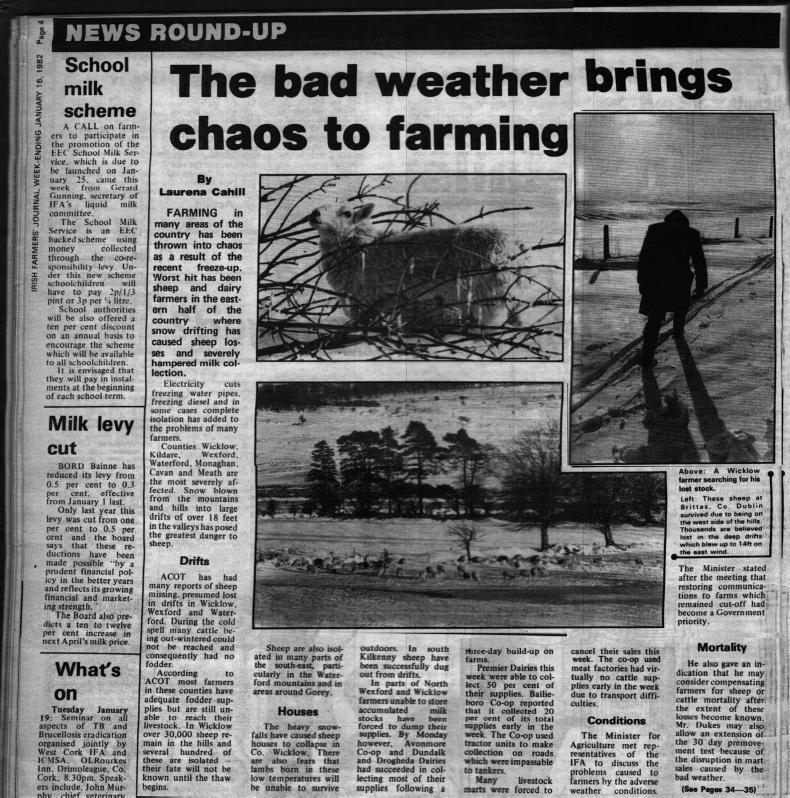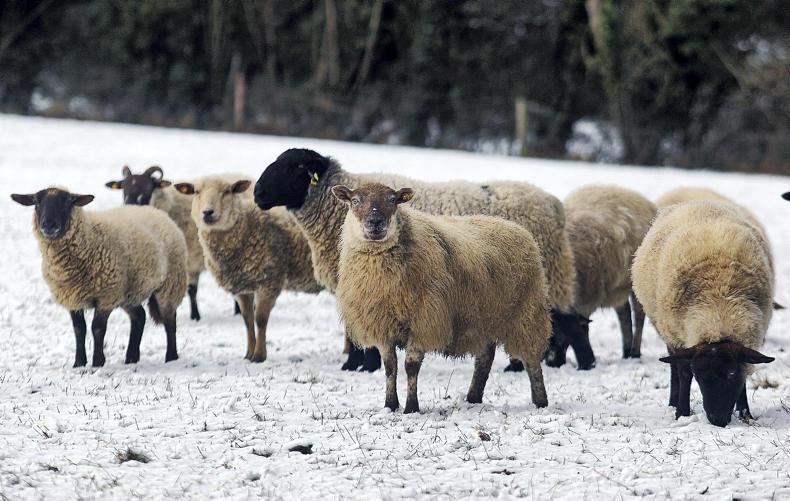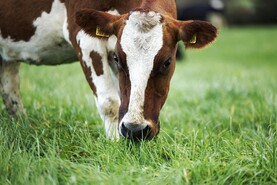Those who experienced the winter of 1982 will scarcely forget the biblical levels of snow that caused the country to come to a standstill.
Dublin Airport reported as much as 25cm of snowfall. This caused nationwide fuel and food shortages as road supply trucks came to a halt due to impassable roads.
This also led to mass school and workplace closures (for as long as two weeks in some places), as well as widespread blackouts due to damaged power lines.
Sheep farmers were among the worst affected, as many struggled to reach flocks cut off in the mountainous areas.
Listen to Pakie Morrissey, who helped collected dead sheep in the snow, in our podcast below:
Dairy farmers also suffered due to the lack of power as the lack of electricity meant cows could not be milked.
Vivid memories
Donie Anderson, a sheep farmer from the Wicklow mountains, has particularly vivid memories of that year.
When asked about how 2018 differs from 1982, he says: “We got less warning of the bad weather. This year, the sheep have sensed the east wind blowing and are coming down from the hills to look for shelter.
“Back then, weather forecast wasn’t as good, but the sheep still didn’t pick up on it as early, so more got caught in the mountains.”

Irish Farmers Journal issue date 16 January 1982, pages 1, 4, 34 and 35.Donie was lucky though, as he says himself: “We didn’t have any losses, none of our sheep got caught in the snow drifts. This year, I have fed all of them brought down from the hills, in an area I can easily access with feed left out for them.”
I see people scrambling for food, but when you live here, you know you have to have enough to keep yourself going
He did, however, experience a lot of trouble with water.
“Our water was frozen for seven weeks. This year I’m filling everything I can with it, so we will hopefully have enough to keep us going.”
Being winter-ready is part of life in the Wicklow Mountains.
“I see people scrambling for food, but when you live here, you know you have to have enough to keep yourself going. I also bought chains for the tyres of my jeep in ’82 that still fit my jeep today.”
He also says it was so cold that “the diesel turned to jelly and blocked the oil filter, because the diesel companies stopped selling winter grade fuel.”
Highland cattle
Donie’s neighbour Peter Jones has over 100 ewes, which he brought down from the mountain to an area where they can access feed and be easily accessed in anticipation of the heavy snow this week.

Highland cattle are built for harsh conditions. Highland cattle are built for harsh conditions.
However, he also runs a herd of 20 Highland cattle. Their thick coats, short legs and long horns provide them with the perfect tools for ploughing through the snow.
While everybody suffered in some capacity 36 years ago, some farmers were able to avoid the worst of it, thanks to some forward thinking.
Monaghan
Owen Sherry, a dairy farmer from Emyvale in Monaghan, was one of those who was managed to avoid the worst of what the “Big Snow” could throw at him.
"We were providing milk to Town of Monaghan Co-Op at the time, which was only two miles up the road. I was milking two cows at the time, with a quota of six gallons a day,” he tells the Irish Farmers Journal.
“There were no milk lorries at the time, so we had to bring the milk to the creamery ourselves or drop it out to be collected, where we had to wait with it or it would be stolen.”

Irish Farmers Journal issue date 16 January 1982, pages 1, 4, 34 and 35.While others were left to toil in darkness of mid-January and unable to milk their cows due to the aforementioned fallen power lines, Owen experienced no such problems, due to a generator he had installed “sometime in the mid 70s”.
There were no milk lorries at the time, so we had to bring the milk to the creamery ourselves or drop it out to be collected, where we had to wait with it or it would be stolen
He was protected from the effects of the severe cold as he “had a loft put in over the milking parlour, so this gave us a lot of protection from the frost and stopped the pipes from freezing over".
Read more
Status red warning: how to handle snow and ice on your farm
In pictures: farmers face ‘beast from the east’
Weather update: what marts will be open and what marts will be closed?
Those who experienced the winter of 1982 will scarcely forget the biblical levels of snow that caused the country to come to a standstill.
Dublin Airport reported as much as 25cm of snowfall. This caused nationwide fuel and food shortages as road supply trucks came to a halt due to impassable roads.
This also led to mass school and workplace closures (for as long as two weeks in some places), as well as widespread blackouts due to damaged power lines.
Sheep farmers were among the worst affected, as many struggled to reach flocks cut off in the mountainous areas.
Listen to Pakie Morrissey, who helped collected dead sheep in the snow, in our podcast below:
Dairy farmers also suffered due to the lack of power as the lack of electricity meant cows could not be milked.
Vivid memories
Donie Anderson, a sheep farmer from the Wicklow mountains, has particularly vivid memories of that year.
When asked about how 2018 differs from 1982, he says: “We got less warning of the bad weather. This year, the sheep have sensed the east wind blowing and are coming down from the hills to look for shelter.
“Back then, weather forecast wasn’t as good, but the sheep still didn’t pick up on it as early, so more got caught in the mountains.”

Irish Farmers Journal issue date 16 January 1982, pages 1, 4, 34 and 35.Donie was lucky though, as he says himself: “We didn’t have any losses, none of our sheep got caught in the snow drifts. This year, I have fed all of them brought down from the hills, in an area I can easily access with feed left out for them.”
I see people scrambling for food, but when you live here, you know you have to have enough to keep yourself going
He did, however, experience a lot of trouble with water.
“Our water was frozen for seven weeks. This year I’m filling everything I can with it, so we will hopefully have enough to keep us going.”
Being winter-ready is part of life in the Wicklow Mountains.
“I see people scrambling for food, but when you live here, you know you have to have enough to keep yourself going. I also bought chains for the tyres of my jeep in ’82 that still fit my jeep today.”
He also says it was so cold that “the diesel turned to jelly and blocked the oil filter, because the diesel companies stopped selling winter grade fuel.”
Highland cattle
Donie’s neighbour Peter Jones has over 100 ewes, which he brought down from the mountain to an area where they can access feed and be easily accessed in anticipation of the heavy snow this week.

Highland cattle are built for harsh conditions. Highland cattle are built for harsh conditions.
However, he also runs a herd of 20 Highland cattle. Their thick coats, short legs and long horns provide them with the perfect tools for ploughing through the snow.
While everybody suffered in some capacity 36 years ago, some farmers were able to avoid the worst of it, thanks to some forward thinking.
Monaghan
Owen Sherry, a dairy farmer from Emyvale in Monaghan, was one of those who was managed to avoid the worst of what the “Big Snow” could throw at him.
"We were providing milk to Town of Monaghan Co-Op at the time, which was only two miles up the road. I was milking two cows at the time, with a quota of six gallons a day,” he tells the Irish Farmers Journal.
“There were no milk lorries at the time, so we had to bring the milk to the creamery ourselves or drop it out to be collected, where we had to wait with it or it would be stolen.”

Irish Farmers Journal issue date 16 January 1982, pages 1, 4, 34 and 35.While others were left to toil in darkness of mid-January and unable to milk their cows due to the aforementioned fallen power lines, Owen experienced no such problems, due to a generator he had installed “sometime in the mid 70s”.
There were no milk lorries at the time, so we had to bring the milk to the creamery ourselves or drop it out to be collected, where we had to wait with it or it would be stolen
He was protected from the effects of the severe cold as he “had a loft put in over the milking parlour, so this gave us a lot of protection from the frost and stopped the pipes from freezing over".
Read more
Status red warning: how to handle snow and ice on your farm
In pictures: farmers face ‘beast from the east’
Weather update: what marts will be open and what marts will be closed?









 This is a subscriber-only article
This is a subscriber-only article











SHARING OPTIONS: